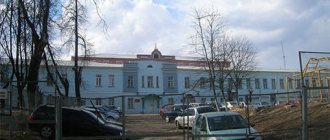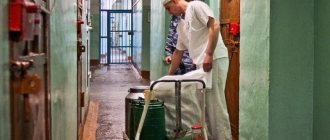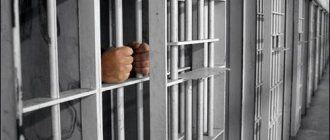Confinement in a colony settlement
The colony-settlement houses convicts sentenced to imprisonment in weakly limited conditions. You can only enter in the following cases:
- The person has committed a crime of moderate gravity or does not pose a danger to others;
- The crime was committed due to negligence;
- The convict showed himself to be on the good side and did not violate the conditions of serving his sentence.
The conditions of detention in these colonies are as follows:
- There are no security representatives in the colony. The order is controlled by administration employees;
- Possibility of movement around the territory until the curfew is announced;
- Traveling outside the territory with the permission of the administration (to attend classes or to work);
- Ability to use personal clothing and belongings;
- No restrictions on visits and sending parcels.
It is also worth noting the fact that a convicted person may ask the administration for permission to rent a house on the territory of the settlement for joint residence with his family. If permission is received from the administration, the convict is obliged to provide the administration with access to the home upon request, and also report to the administration at least once a week.
Serving a sentence in a general regime colony
In such places, men who have committed a serious crime or male persons who have not previously served a sentence of imprisonment serve their sentences. Also, women are serving sentences in these institutions, including after committing a crime again.
The result of the trial may be a sentence with a requirement to send the offender to serve his sentence in a general regime colony. These institutions also house convicts who have violated the rules of being in a colony-settlement.
General regime colonies differ in their conditions of detention. There are three types of detention conditions:
- Lungs;
- Regular;
- Strict.
The decision to transfer to other conditions of detention is made on the basis of the convict’s compliance with the rules of the colony. If a person regularly follows all the rules and shows his best performance, then after six months he can be transferred to lighter conditions of detention. Very often, convicts do not comply with the conditions of detention and in this case they are placed in a punishment cell.
The procedure and conditions for the execution of punishment in the form of imprisonment in prisons
Category: Criminal law.
Discussions on the existence of prisons have been going on in academic circles for a long time, and there are different positions on this issue:
- prisons should be abolished altogether;
- the entire system of serving imprisonment for adult convicts should be built on a prison principle;
- prisons should be left in small numbers for the most dangerous category of convicts.
The current legislation has adopted the latter point of view.
Men are serving their sentences in prisons (Part 2 of Article 58 of the Criminal Code of the Russian Federation, Part 7 of Article 74 of the Penal Code of the Russian Federation):
- sentenced to imprisonment for a term of more than 5 years for committing especially serious crimes, as well as in cases of especially dangerous recidivism of crimes. In this case, the court counts the time the convicted person was held in custody before the conviction came into force as part of the term of serving the sentence in prison. After serving the specified term of punishment in prison, the convicted person must serve the remainder of the term of imprisonment in a maximum security colony if a particularly serious crime has been committed, or in a special security colony in the event of a particularly dangerous recidivism of crimes;
- convicts transferred for malicious violations of the order of serving a sentence from correctional colonies of general and strict regime for a period of not more than 3 years with the remainder of the sentence served in a correctional colony of the type from which they were sent to prison.
Convicted women are not subject to transfer to prison (clause “c” of Part 4 of Article 78 of the Penal Code of the Russian Federation). Women serve imprisonment only in settlement colonies, general regime correctional colonies and in economic service units in pre-trial detention centers (SIZOs).
There are two types of regime in prisons: general and strict. Due to the specifics of this type of correctional institution, there are no easier conditions for serving a sentence, since prisons must ensure the maximum degree of isolation for convicts. This is how prisons differ from correctional colonies, including a special regime correctional colony.
All categories of convicts admitted to this correctional institution, as well as convicts transferred from the general regime of the prison for malicious violations of the order of serving their sentences, are kept in a strict regime prison. If the convict was temporarily released from prison, for example, for the duration of treatment in a medical correctional institution, then upon returning to prison he will serve his sentence under the type of regime from which he was sent for treatment.
Convicts who are disabled people of group 1 or 2 cannot be kept in a strict regime prison.
The rule that all convicts admitted to prison are placed on a strict regime is determined by the desire to achieve a kind of shocking effect, since the conditions for serving a sentence in a strict regime are the most stringent.
The possibility of transferring to a general regime arises for a convicted person after he has been in a strict regime for at least 1 year. After this, the prison administration, in accordance with Art. 87 of the Penal Code of the Russian Federation is obliged to consider the possibility of transferring a convicted person to a general regime, but his behavior is also taken into account.
In the prison, a commission is created from employees of various services of the institution and representatives of local government bodies, which considers materials on the transfer of convicts from high security to general security. The decision of the commission is documented in a protocol, after which, by order of the head of the prison, the convict is transferred to general regime. The commission may refuse to transfer to a general regime if, while in a strict regime, the convicted person committed violations of the established procedure for serving the sentence. The convicted person may appeal this decision in accordance with the established procedure.
The Penal Code of the Russian Federation provides for the possibility of transferring a convicted person not only to more lenient conditions of serving his sentence, but also to more stringent ones, depending on his behavior in places of imprisonment. Transfer to a strict regime is possible if the convicted person violates the established procedure for serving the sentence, and the convicted person must be recognized as a persistent violator of the regime.
Repeated transfer of convicts from a strict regime to a general regime is possible after serving at least 1 year of their sentence in a strict regime. The issue is again considered by the commission, taking into account both the formal grounds and the behavior of the convicted person.
The conditions for serving imprisonment in prisons are stricter than in other places of imprisonment.
Prisons are closed-type penitentiary institutions, in which convicts are required to constantly remain in their cells and leave them only with the knowledge of the administration.
Taking into account the fact that convicts who pose a high social danger are sent to prisons, increased demands are placed on ensuring their isolation. Unlike correctional colonies, the prison territory is enclosed by a stone wall no less than 4.5 m high, which is equipped with engineering and technical security equipment. The prison territory is divided into two parts - a security zone and a utility yard. Convicts, with the exception of those left in prison for economic maintenance, cannot be outside the restricted area.
Those sentenced to imprisonment are held in prisons in locked shared cells. In necessary cases, by reasoned decision of the head of the prison and with the consent of the prosecutor, convicts may be kept in solitary confinement.
The placement of convicts in cells is carried out in compliance with the requirements provided for in Art. 80 of the Penal Code of the Russian Federation. In addition, convicts under general and strict regimes are kept separately. Convicts transferred from one correctional institution to another are also kept isolated from other convicts and kept separately; convicts left in prison to perform maintenance work.
Convicts left in prison to carry out work on the economic maintenance of this institution (in accordance with Article 77 of the Penal Code of the Russian Federation) are kept separately under the conditions provided by the Penal Code for a general regime correctional colony. They live in unlocked shared cells and have access to a daily exercise of 2 hours. Otherwise, the legal status of convicts left in prisons to perform work on the economic maintenance of these institutions does not differ from the legal status of convicts in general regime correctional colonies.
Walks for convicts held in prison are carried out cell-by-cell during the daytime in a specially equipped outdoor part of the prison territory. A convicted person's walk may be terminated early if he or she violates the established internal rules.
Convicts serving a sentence under a general regime are allowed to: spend a month on the purchase of food and basic necessities in addition to the funds specified in Part 2 of Art. 88 of the Penal Code of the Russian Federation, other funds available on their personal accounts in the amount of 800 rubles; have 2 short-term and 2 long-term dates during the year; receive 2 parcels or transfers and 2 parcels during the year; Take a daily walk of one and a half hours.
Convicts serving a sentence under strict regime are allowed to: spend a month on the purchase of food and basic necessities in addition to the funds specified in Part 2 of Art. 88 of the Penal Code of the Russian Federation, other funds available on their personal accounts in the amount of 600 rubles; have 2 short-term dates during the year; receive 1 parcel and 1 parcel post during the year; Take a daily walk of one hour.
The general rule for any walk is that it must be carried out during the daytime in a specially equipped part of the prison grounds. Such areas are usually established on the roofs of secure buildings and are called exercise yards. They are specially equipped and technically equipped, which is necessary to supervise convicts throughout the entire duration of the walk and ensure compliance with the requirements of the law on conducting the walk in cells.
The walk may be terminated if the convicted person violates the established rules for its conduct. Stopping the walk is not a disciplinary measure, but is a purely preventive measure that allows the prison administration to immediately isolate convicts in cells to prevent the occurrence of excesses, especially with the participation of a large number of convicts (mass disobedience or riots).
Telephone conversations of convicts held in prisons are carried out in accordance with Art. 92 of the Penal Code of the Russian Federation. It is the responsibility of the prison administration to monitor such conversations due to the peculiarities of the regime requirements established in prisons.
Thus, serving a sentence in prison is one of the most severe, so convicts experience a certain fear and do not show much desire to end up there; however, in the informal relations of convicts, the fact of transferring someone to prison is recognized as worthy of respect - “he went to the covered zone” (meaning to a closed area, i.e. to prison) and support funds are transferred to him from the “thieves’ common fund”. And when a convict returns to a correctional colony from prison, he is surrounded by a certain aura of glory “he was in the covered one.” So, in educational terms, the transfer of convicts to prison, as practice shows, gives little, but such transfers are nevertheless carried out constantly in order to improve the situation in a particular correctional institution.
- Back
- Forward
Serving a sentence in a maximum security prison
Punishment in the form of imprisonment and serving a sentence in a maximum security prison is applied when males commit especially serious crimes or when they repeatedly violate the legislation of the Russian Federation. It is worth noting that such punishment is not applied to females.
In such institutions there are also different types of detention, which are similar to those in general regime colonies. The main difference between a maximum security prison and other similar institutions is that you can count on relaxation in conditions of detention only after 9 months.
The procedure and conditions for the execution of punishment in prisons
In accordance with the current criminal (Article 58 of the Criminal Code) and penal legislation (Article 130 of the Criminal Code) the following sentences are served in prisons:
1) those sentenced to imprisonment for a term of more than 5 years for committing especially serious crimes, as well as in cases of especially dangerous recidivism of crimes. They may be ordered to serve part of their sentence in prison;
2) persons transferred from correctional colonies of general, strict, special regime for malicious violation of the established procedure for serving a sentence for a term of up to 3 years;
3) persons left in prison to perform housekeeping work in the manner prescribed by Art. 77 PEC.
Among the main means of correcting convicts held in prisons, the most important place belongs to the regime. The regime for serving sentences, security and isolation of convicts in prison is much stricter than in other correctional institutions. First of all, reliable external and internal isolation of convicts is ensured here: the prison territory is divided into a security zone and a utility yard.
The main distinctive feature of the regime in prisons is that the movement of convicts on its territory is allowed only under escort. One of the features of the regime is to ensure strict isolation of various categories of persons held here.
For this purpose, the administration is developing a plan for cell-by-cell placement of convicts in accordance with the requirements of Article 80 of the Penal Code.
The requirement of laws on separate detention of different categories of convicts in prison is implemented by placing convicts in cells:
a) according to the type of regime of those colonies where they will be sent after serving a prison sentence determined by a court verdict;
b) according to the type of regime of the colonies from which they arrived in prison, as determined by the court. Convicts from these groups can be held together if they have the same type of regime.
One of the main features of the prison regime is that convicts are kept in common locked cells under constant guard and supervision. If necessary, by reasoned decision of the prison director, agreed with the prosecutor, convicts may be kept in solitary confinement.
. The transfer of a convicted person to solitary confinement in a prison, unlike such a transfer in a special regime colony, is not a disciplinary measure. It is carried out due to some extraordinary circumstances (for example, the illness of a convicted person, when his presence in the same cell with others becomes clearly undesirable and painful for them). The law does not define the length of detention in solitary confinement. When the reasons causing such a transfer no longer exist, the convicted person can be returned to the general cell.
According to Art. 130 of the Penal Code in prisons, two types of regime are established: general and strict, differing in the degree of isolation and the scope of legal restrictions for convicts. All arriving convicts are kept in a strict regime and after serving one year of their sentence they can be transferred to a general regime.
The transfer is formalized by a decree of the head of the prison. Early transfer of a convicted person from a strict regime to a general regime is not permitted.
According to part 3.6 of Art. 130 maximum security prisons contain:
1) convicts admitted to a correctional institution;
2) convicts transferred from general regime and recognized as malicious violators of the established procedure for serving their sentence.
The procedure for applying incentives and penalties in prisons is the same as in all correctional institutions.
Penal measures in prisons, as in colonies, include socially useful work, educational work, general educational and vocational training. The work of convicts serving imprisonment in prisons is organized only on the territory of the prison; the removal of convicts from outside the prison is prohibited. Every time convicts are removed from their cells and workshops, they are subjected to a search, and the premises are subject to a thorough inspection.
The time spent by convicted persons while serving a sentence of imprisonment is counted towards their total length of service. The recording of time worked is the responsibility of the prison administration and is carried out by it at the end of the calendar year. They do not take vacations.
Conditions and remuneration, as well as deductions from the earnings of convicts, are regulated by penal legislation.
The length of the working day for convicted persons is regulated by the labor legislation of the Russian Federation.
3. Features of execution of punishment
in
educational colonies
In educational colonies (hereinafter referred to as VC), juvenile convicts between the ages of 14 and 18 serve their sentences of imprisonment. Negatively characterized prisoners sentenced to imprisonment who have reached the age of 18 years are transferred to further serve their sentence from the penal colony to a general regime penal colony or to an isolated section of the penal colony. In order to consolidate the results of correction, completion of secondary (complete) general education or professional training, convicts who have reached the age of 18 years can be left in the VK until the end of their sentence, but no more than until they reach the age of 19 years.
Retention of convicts who have reached the age of 18 years in the penal colony is carried out by a reasoned decision of the head of the educational colony, authorized by the prosecutor (Article 139 of the Penal Code).
The work of the VK administration begins from the moment the students arrive in the colony. All new arrivals must undergo a two-week quarantine in order to study their personality, health status, familiarize convicts with the main provisions of the law, the daily routine of the colony, etc.
The quarantine room is isolated from other premises of the colony. If, for medical reasons, an increase in the quarantine period is required, then by order of the head of the colony, the pupil is transferred to the hospital of the colony’s medical unit. Educational work among this category of persons is organized according to a special program. Classes are conducted by the head of the colony, his deputies, heads of services, the director of a vocational school, educators, teachers, and foremen.
All pupils arriving at the colony are examined by a full-time psychologist. His observations and conclusions about the individual characteristics of each pupil, as well as other data accumulated about him by the VK staff, are reflected in the diary of individual work with the convict. Based on these conclusions, the selection committee, consisting of the head of the military commission (his deputy), representatives of units and services, and senior detachment educators, makes a decision on sending the newcomer to the appropriate detachment, department, class, professional or production group.
The Criminal Code establishes ordinary, simplified, preferential and strict conditions for serving a sentence (Article 132 of the Penal Code). Under normal conditions, juvenile convicts admitted to the VK serve their sentences in the VC, except for those who previously served imprisonment and those convicted of intentional crimes committed while serving their sentence, as well as juvenile convicts transferred from lightened, preferential or strict conditions of serving their sentence.
If the convicted person during his stay in the pre-trial detention center was not recognized as a malicious violator of the established procedure for serving the sentence, the period of his stay under normal conditions is calculated from the day of his detention.
After serving 3-6 months of the sentence under normal conditions (in the absence of penalties for violating the established procedure for serving the sentence and conscientious attitude to work and study), the convicts are transferred to lighter conditions.
Those convicted of intentional crimes committed while serving imprisonment and who previously served imprisonment serve their sentences under strict conditions. Convicts recognized as malicious violators of the established procedure for serving their sentences and transferred from regular and lighter conditions of serving their sentences also serve their sentences under strict conditions.
After 6 months, in the absence of penalties for violating the established procedure for serving the sentence and with a conscientious attitude to work and study, they are transferred to the usual conditions of serving the sentence.
To prepare for parole, convicts serving their sentences in light conditions are transferred to preferential conditions for serving their sentences.
In case of malicious violation of the regime, convicts are transferred from ordinary conditions to strict conditions of serving a sentence, from light conditions to ordinary or strict conditions, from preferential conditions to ordinary conditions of serving a sentence.
The transfer of convicts from one conditions of serving a sentence to another is carried out by the head of the VK on the recommendation of the educational council of a given colony, except for the transfer from ordinary conditions of serving a sentence to lighter ones, which is carried out on the recommendation of the council of educators of the detachment. Members of the board of trustees of a given colony, parent committees, as well as representatives of government bodies and local self-government at the location of the colony can take part in resolving these issues.
The legal status of convicts under certain conditions of serving their sentences has significant differences both in the volume of benefits provided and in living conditions. Convicts who are in ordinary and simplified conditions of serving their sentences live in dormitories located on the territory of the penitentiary colony, in preferential conditions - in dormitories, but, as a rule, outside the penal colony and without security (but under the supervision of the administration of the colony), in strict conditions While serving their sentences, convicts live in isolated living quarters, locked during free time from study or work.
The placement of convicts in certain conditions of serving their sentence depends on their behavior, attitude to work and education. For good behavior, a conscientious attitude to work and study, active participation in the work of amateur organizations of convicts and in educational activities for convicts serving sentences in the VK, in addition to general types of incentives, incentive measures such as granting the right to attend cultural, entertainment and sports events may be applied. events outside the VK, accompanied by employees of this colony (except for events held at night). They may also be given the right to leave the VC, accompanied by their parents, persons in their stead, or other close relatives. The duration of leaving the VC is set by the head of a given colony, but cannot exceed eight hours. In addition, juvenile convicts may, as an incentive, be early released from a disciplinary detention center by a decision of the head of the colony or his deputy. As special penalties for convicted minors, deprivation of the right to watch films for one month and placement in a disciplinary cell for up to seven days with assignment to study may be applied.
The VK organizes a unified educational process in order to correct those sentenced to imprisonment and prepare them for independent life.
The educational process is aimed at developing in convicts law-abiding behavior, a conscientious attitude to work and study, obtaining primary vocational education, vocational training, and improving the educational and cultural level.
Convicted minors are required to receive basic (complete) education, primary vocational education and vocational training, which are carried out on the basis of evening educational schools, vocational schools and VK enterprises. Convicted minors are involved in work at the VK enterprise, their work is regulated by the labor legislation of the Russian Federation.
In order to increase the effectiveness of educational influence on convicts and to provide assistance to the administration of educational colonies, parental committees of parents, persons replacing them, and other close relatives of convicts can be created within detachments of the colonies. The activities of parent committees are regulated by regulations approved by the head of the colony.
Special regime colonies
If a person repeatedly commits a particularly dangerous crime while serving his sentence or is sentenced to life, he will be transferred to a maximum security colony. The conditions of detention in such institutions are much stricter compared to those discussed above. In special regime institutions there is also a distinction according to the conditions of detention, but even the simplified conditions of serving a sentence cannot be compared with the strict conditions in the colonies that were considered before. It is worth noting that even in special regime institutions the possibility of switching to easier conditions is allowed, but this right can only be exercised after a year.





